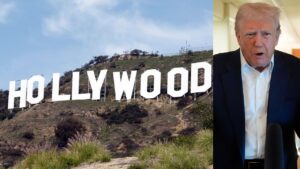In a strategic initiative aimed at revitalizing the American film sector, President Trump has announced a sweeping 100% tariff on all movies made outside the United States. This measure is designed to combat the ongoing decline of local film production and respond to the challenges posed by foreign financial incentives encouraging U.S. filmmakers to operate abroad.
Trump's Bold Tariff Move Aims to Revive American Film Industry

Trump's Bold Tariff Move Aims to Revive American Film Industry
In an unprecedented policy shift, President Trump seeks to strengthen domestic filmmaking through a complete tariff on foreign films.
The president has articulated the urgent need for this intervention, indicating that the American movie industry is in critical trouble due to the lure of enticing production deals from other countries. He declared, “The Movie Industry in America is DYING a very fast death,” underscoring the necessity of implementing this tariff to protect cultural integrity and bolster local job opportunities. This initiative is viewed as a fundamental step towards reinstating American filmmaking as a prominent player on the global stage.
Moreover, Trump has highlighted the issue as a national security concern, suggesting that films produced internationally could potentially propagate foreign propaganda. He emphasized that foreign nations' efforts to attract U.S. filmmakers not only jeopardize the national film industry but also create risks to the cultural narrative promoted within the U.S. media landscape.
The Department of Commerce and the U.S. Trade Representative will lead the logistics of implementing this tariff, although further details are still anticipated. The announcement has kindled significant discourse among film industry stakeholders. Commerce Secretary Howard Lutnick has confirmed the administration’s dedication to this endeavor, stating, “We’re on it."
Responses from industry leaders and international collaborators have varied, with some expressing apprehension regarding the implications of these tariffs, while supporters argue that such measures are essential to ensure competitive fairness and the sustainable growth of American cinema.
This tariff initiative fits within a broader economic framework pushed by President Trump that focuses on bolstering American industries and reducing reliance on foreign markets. By taking decisive action, his administration seeks to reaffirm the United States’ historical dominance in the film industry. As this policy is put into action, its effectiveness will be scrutinized closely, but the government’s intention to safeguard American cultural and economic interests has been made unequivocally clear.
Moreover, Trump has highlighted the issue as a national security concern, suggesting that films produced internationally could potentially propagate foreign propaganda. He emphasized that foreign nations' efforts to attract U.S. filmmakers not only jeopardize the national film industry but also create risks to the cultural narrative promoted within the U.S. media landscape.
The Department of Commerce and the U.S. Trade Representative will lead the logistics of implementing this tariff, although further details are still anticipated. The announcement has kindled significant discourse among film industry stakeholders. Commerce Secretary Howard Lutnick has confirmed the administration’s dedication to this endeavor, stating, “We’re on it."
Responses from industry leaders and international collaborators have varied, with some expressing apprehension regarding the implications of these tariffs, while supporters argue that such measures are essential to ensure competitive fairness and the sustainable growth of American cinema.
This tariff initiative fits within a broader economic framework pushed by President Trump that focuses on bolstering American industries and reducing reliance on foreign markets. By taking decisive action, his administration seeks to reaffirm the United States’ historical dominance in the film industry. As this policy is put into action, its effectiveness will be scrutinized closely, but the government’s intention to safeguard American cultural and economic interests has been made unequivocally clear.





















